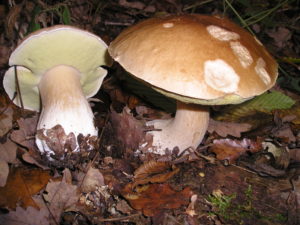
Eating mushrooms has always been considered part of a healthy diet. A group of researchers, after reviewing many studies, concluded that eating mushrooms frequently is associated with a lower risk of cancer, especially breast cancer. Thus consuming mushrooms may be protective against cancer.
The Penn State College of Medicine researchers reviewed 17 studies (from 1966 to Oct 2020), all of them observational, so it doesn't prove that mushrooms are protective, but it looks promising... They think the beneficial effect is from the ergothioneine in mushrooms, an antioxidant and cellular protector, and found in a variety of mushrooms.
In 2020 the same group also published similar/almost the same review of 17 studies from 1966 to 2019. At the time they stated that the mushroom-cancer association was only observed in studies from non-western regions. Perhaps mushrooms were a bigger part of the diet in those cultures? They also said when looking at the dose and response, can see that a "10/gram per day increase in mushroom intake was associated with a 17% lower risk of cancer", especially breast cancer.
From Medical Xpress: Higher mushroom consumption is associated with a lower risk of cancer
Next time you make a salad, you might want to consider adding mushrooms to it. That's because higher mushroom consumption is associated with a lower risk of cancer, according to a new Penn State study, published on March 16 in Advances in Nutrition.
The systematic review and meta-analysis examined 17 cancer studies published from 1966 to 2020. Analyzing data from more than 19,500 cancer patients, researchers explored the relationship between mushroom consumption and cancer risk.
Mushrooms are rich in vitamins, nutrients and antioxidants. The team's findings show that these super foods may also help guard against cancer. Even though shiitake, oyster, maitake and king oyster mushrooms have higher amounts of the amino acid ergothioneine than white button, cremini and portabello mushrooms, the researchers found that people who incorporated any variety of mushrooms into their daily diets had a lower risk of cancer. According to the findings, individuals who ate 18 grams of mushrooms daily had a 45% lower risk of cancer compared to those who did not eat mushrooms.
"Mushrooms are the highest dietary source of ergothioneine, which is a unique and potent antioxidant and cellular protector," said Djibril M. Ba, a graduate student in epidemiology at Penn State College of Medicine. "Replenishing antioxidants in the body may help protect against oxidative stress and lower the risk of cancer."
When specific cancers were examined, the researchers noted the strongest associations for breast cancer as individuals who regularly ate mushrooms had a significantly lower risk of breast cancer. Ba explained that this could be because most of the studies did not include other forms of cancer. Moving forward, this research could be helpful in further exploring the protective effects that mushrooms have and helping to establish healthier diets that prevent cancer.
